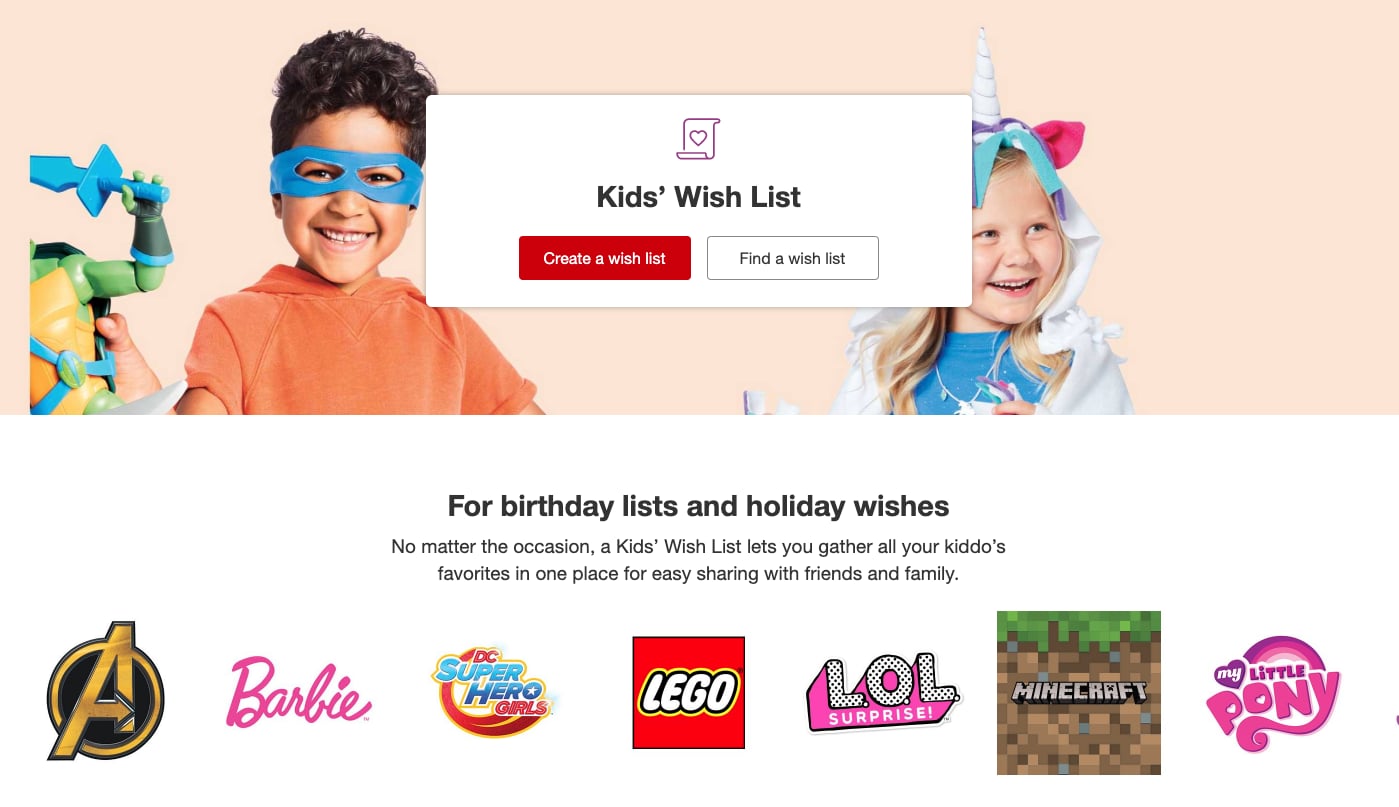Should Parents Make Christmas Gift Registry For Kids?
Parents Are Now Making Christmas "Wish List" Registries For Their Kids — And Their Reasons Make a Lot of Sense

We've all been there — or at the very least, we all fear being there. Our kid is eagerly ripping open a gift from a relative, but before the torn wrapping paper even hits the floor, our once-reasonable child cops an attitude: "This isn't what I wanted!" "I already have one of these!" "I hate this!"
Sure, we spent nearly every day of the holiday season drilling into their tiny heads that it's the "season of giving" and laying on thick the lessons about gratitude and generosity — but none of it matters when a preschooler with no emotional filter doesn't get the exact 50-piece Lego set they saw at the store three months earlier.
Many parents are turning to the same process they likely used when planning a wedding or prepping for a baby.
What's an embarrassed parent to do? Well, aside from continuing to teach their kiddos the merits of social decorum, many are turning to the same process they likely used when planning a wedding or prepping for a baby. They are creating registries for their kids' Christmas gifts.
Of course, it's not unheard of for parents to share a handwritten list of beloved toys with grandparents who want to pick out the perfect present, but this new trend takes it to a whole new level — one in which, with the click of a mouse, your contact list can see the 60-odd toys your kids covet most.
Online and traditional retailers have all jumped on board this expanded take on gift registries. Amazon lets users create a "wish list" that they can then share with others. Walmart offers a similar list, and Target has registries for every celebration imaginable, including one with an app that's devoted to kids. On the site, it notes that "no matter the occasion, a Kids' Wish List lets you gather all your kiddo's favorites in one place for easy sharing with friends and family." And, of course, niche registry sites — like Kinderlist and Giftster, which has nearly a million members and promises to offer a "simpler way to give and gift gifts without the anxiety" — allow you to make a list with products from a slew of different stores or even intangible experiences.

But, if one thing can be said about wedding registries, they are rife with etiquette missteps. The same holds true for these kid-specific registries — some people love the concept while others despise the tone it sets.
The Benefits of a Christmas Gift Registry
For those parents who create these registries, it's an opportunity to let friends and family know exactly what their kid wants, and for many relatives, they would rather just know what to buy versus trying to guess. For many people who don't have similarly aged kids of their own, it can be stressful to figure out, say, what a 6-year-old kid is into these days. Is it Frozen or Avengers? Picture books or chapter books? A registry with specific brands can take the edge off of worrying if the gift will go over well.
A registry can also shut down gendered gift-giving. It's not atypical for girls to receive more dolls and crafts and boys to receive more toy cars and action figures — and often gift-givers don't realize they are playing into a stereotype that may not represent your child. By creating a list, you can help steer them in the right direction for your particular child. In fact, Kinderlist purposefully allows users to search by price, age, eco-friendliness, and interest while actively not offering the ability to filter by gender.
For those passionate about reducing waste, registries help avoid the overflow of garbage that can inevitably follow unwanted toys and their packaging.
Plus, a registry notes when a gift has been purchased, thus eliminating the awkwardness of duplicate gifts — a common problem when parents tell everyone who asks the same five things their kid "is into right now." As helpful as that can be on a small scale, when you have a dozen people shopping for a kiddo, that can mean a lot of Moana dolls or Hungry Hungry Hippos board games.
The Concerns With a Christmas Gift Registry
For many, the mere idea of registering for the holidays seems to go against the Christmas spirit. And although many people would be happy to receive strict guidelines when shopping, others abhor it — they prefer looking for a gift that speaks to them, that they think a child might enjoy. To them, it's far more personal to give a gift of a game that they enjoyed playing when they were little, or a puzzle that they would love to work on alongside the recipient one afternoon.
For many, the mere idea of registering for the holidays seems to go against the Christmas spirit.
What's more, a hidden benefit of off-registry, "surprise" gifts is that your child might end up discovering a new interest or ability. If a kid only requests Pixar DVDs and ends up getting a rock-painting kit, they may not like it at first, sure, but there's also an invaluable opportunity to experience something new. It also allows gift-givers who know a thing or two about childhood development (ahem, teachers and veteran parents!) to give a gift they know will go over well that you or your child may not even know exists.
Even though online registries can include small-scale brands and one-of-a-kind items like those found on Etsy, it does present limitations for those who'd prefer to make something themselves, bring back a gift from a recent trip, shop at their favorite local shop, or present a family heirloom. Another frustration for those who love the act of giving? Sitting at the computer and entering in a credit card number before ordering a toy that will be shipped directly to the recipient with no special card or wrapping just feels sterile and impersonal.
What to Consider If You Plan to Make a Christmas Gift Registry
The idea of a kids' Christmas registry will frustrate some family members no matter what, but if you are determined to avoid embarrassing present-opening behavior this season, there are a few ways to ensure your registry sends the right message:
- Only send it upon request. Most people will let you know if they'd like help with gift ideas. For those who ask, you ostensibly have free reign to share a link to your child's registry. This way, you also aren't forcing gift-givers to adhere to your list and you also aren't putting pressure on, say, a coworker or second cousin to buy a gift they quite honestly weren't planning to in the first place.
- Include a wide range of prices. A children's holiday registry should have the bulk of the items firmly in the "affordable" zone. For most, that's $10 to $30. It's fine to have some big-ticket items — a nice option for those who like to go in on group gifts — but they shouldn't be the bulk of what's listed.
- Stress that the list is just a starting point. If you are sending out the registry en masse, it might be nice to include a note that explains that these gifts are merely an inspiration board, so to speak, or a sample of ideas to help anyone who may or may not be shopping for your child. That way, those who want to make quick work of their holiday shopping can click to buy while others can note all the Minecraft items and go on the hunt for the perfect gift inspired by the computer game.
- Manage your child's expectations. If your child is aware of the registry, and especially if they help select or scan items for it, they need to understand that it doesn't mean they will get everything on it. Do your best to remind them that they should appreciate every gift, big or small, requested or unexpected — that it's truly the thought that counts.








